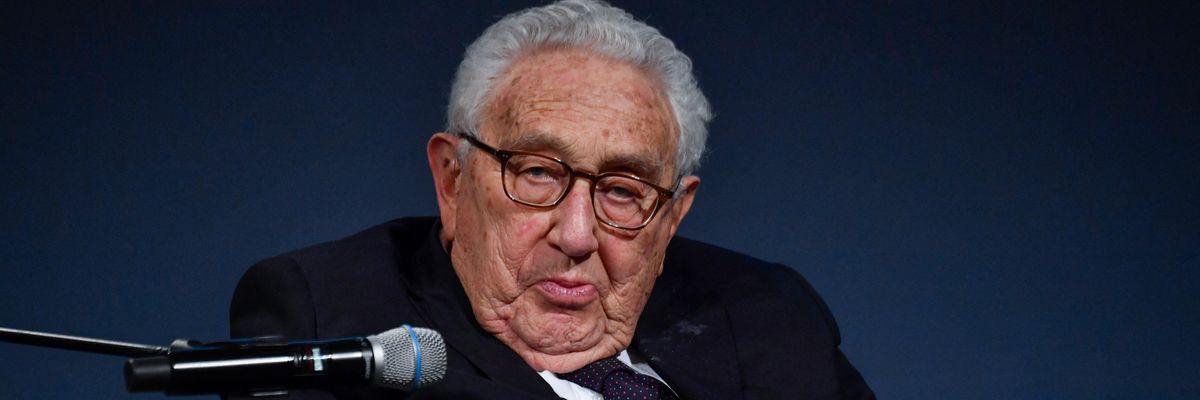As conservative pundits cry crocodile tears over the alleged decline of excellence and integrity at Harvard, symbolized by former University President Claudine Gay, there’s a more significant scandal worth addressing. Recently announced by the University is the Henry A. Kissinger Professorship of Statecraft and World Order.
As specified in the job description, a successful candidate “will be a distinguished analyst of diplomacy, strategy and statecraft,” and have an “excellent record of academic achievement and of contributing to public policy debate on how to build a stable international order.” The presumption is that the late Henry Kissinger exemplified these virtues.
Over the past five decades, the evidence has steadily accumulated that Kissinger was a secretive, fiercely competitive, habitually dishonest, ruthless promoter of American dominance in the world, irrespective of the cost to tens of millions of people. His policy recommendations regarding Chile, Argentina, East Timor, Pakistan, Vietnam, Laos, and Cambodia were as destabilizing, as they were cruel. Some of these human rights calamities must surely be known by the authorities at Harvard’s Kennedy School.
Yet at Harvard—as for numerous U.S. institutions and mainstream media—Kissinger’s crimes and failed policies were of no consequence. Certainly not a reason to preclude a named chair, an honored spot-on TV news, a special column for the Washington Post, or invitations to the White House and State Department.
No matter how much harm you cause, or how unwise your recommended policies, if you inhabit a certain stratum in the American hierarchy—and have made yourself a celebrity—you can get away with it.
Henry Kissinger played an instrumental role in a surprisingly long list of international tragedies. However, it is worth remembering that in none of these cases, did he act alone. Most of his recommendations were offered in tandem with Presidents Nixon and Ford, and were for the most part in line, with the preferences of people in the “national security” bureaucracies, notably the CIA and military.
Most unusual was Kissinger’s public face during the time he held public office and afterward. In the early Nixon presidency, he lost no opportunity to be in front of a camera, and after the Nixon White House became shadowed by Watergate, Kissinger’s media omnipresence was an administration asset.
In the decades that followed, Kissinger remained prominent, writing thousands of pages of self-justification, offering theories of international relations, and often dispensing unwise advice—notably his vocal support for the Bush administration’s invasion of Iraq in 2003.
The Vietnam War was of course the “original sin.” Although Kissinger readily accepted the Nobel Peace Prize for helping to negotiate the 1973 Paris Peace agreement, he knew it to be fraudulent: once all U.S. military forces departed Vietnam, the fighting would resume, with Hanoi the likely victor.
So long as government records remained classified, it was possible to imagine that Kissinger was the author of “Vietnamization”—Nixon’s policy of removing large increments of U.S. troops, while handing over greater responsibility for the fighting to the South Vietnamese. Yet ironically, this was the one Nixon policy, which Kissinger opposed. His disdain for the South Vietnamese government and its army (ARVN) was ongoing. And by contrast to Nixon, and some other administration colleagues he was undeterred by the sacrifice of American soldiers. His advice was habitually in the service of escalation when it came to Cambodia, Laos, the bombing of North Vietnamese cities, and the more aggressive use of U.S. air power in the South.
This blood-stained history returns us to Harvard’s morally obtuse decision to create a Chair in his honor. Indeed, this perhaps is Kissinger’s most abiding legacy: the failure of accountability. No matter how much harm you cause, or how unwise your recommended policies, if you inhabit a certain stratum in the American hierarchy—and have made yourself a celebrity—you can get away with it.
This personal story exemplifies the more far-reaching phenomenon: the failure of the United States to ever take responsibility for the human suffering it has caused in other nations, or to affect the institutional changes which might prevent this. Here we are once again: giving billions of dollars in weapons to Israel, as its military massacres thousands of defenseless Palestinian women and children. Many young Americans find this incomprehensible.
